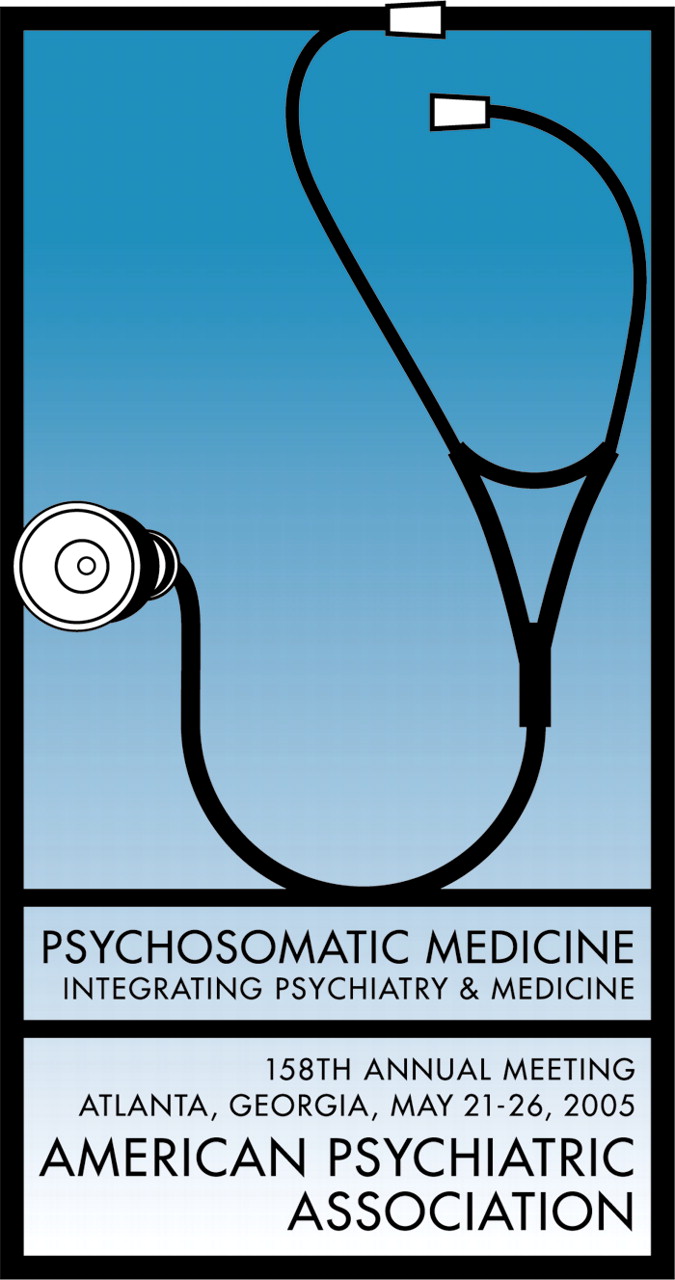COURSE 1: DSM-IV-TR CULTURAL FORMULATIONS: DIAGNOSIS AND THERAPY
Director: Russell F. Lim, M.D. Faculty: Frank Brown, M.D., David C. Henderson, M.D., Roberto Lewis-Fernandez, M.D., Francis G. Lu, M.D., J. Charles Ndlela, M.D. Educational Objective: At the conclusion of this course, the participant should be able to (1) understand and describe the five parts of the DSM-IV-TR outline for cultural formulation; (2) be able to apply it to the treatment of three of the following four groups: African-American, Asian, Hispanic, and American-Indian patients; and (3) understand how ethnicity affects psychopharmacology and psychotherapy. Course Level: This is a basic course. No prior experience or knowledge is required. This is a revision of a course given last year. Sat., May 21, 8-12; Georgia World Congress Center; fee: advance $100, on site $130; spaces available: 30
COURSE 2: THE EVALUATION AND IDENTIFICATION OF THE MAJOR DEMENTIAS
Director: Raymond A. Faber, M.D. Faculty: Kevin F. Gray, M.D., Randolph B. Schiffer, M.D. Educational Objective: At the conclusion of this course, the participant should be able to (1) evaluate all major cognitive and higher cortical functions; (2) utilize any of several cognitive and executive function screening batteries; (3) recognize the most common presentations and course of Alzheimer's disease and appreciate the behavioral disorders that most frequently complicate Alzheimer's disease; and (4) differentiate Lewy body dementia, frontotemporal dementias, and vascular dementias from Alzheimer's disease. Course Level: This is an intermediate course. Participants should have experience in treating patients with dementia. This is a repeat of a course given last year. Sat., May 21, 8-12; Georgia World Congress Center; fee: advance $100, on site $130; spaces available: 100
COURSE 3: ADD IN CHILDREN AND ADOLESCENTS
Director: Thomas E. Brown, Ph.D. Faculty: Jefferson B. Prince, M.D. Educational Objective: At the conclusion of this course, the participant should be able to (1) recognize types of child and adolescent attention-deficit disorders (ADDs); (2) assess and diagnose ADDs using updated instruments and methods; (3) select appropriate medications for ADDs with comorbid conditions; and (4) design multimodal treatment programs for ADD children and adolescents. Course Level: This is a basic course. No previous experience or knowledge is required. This is a repeat of a course given last year. Sat., May 21, 8-12; Georgia World Congress Center; fee: advance $100, on site $130; spaces available: 125. Similar courses on this topic will be offered on Sun., May 22, 8-12; Tue., May 24, 1-5; and Thu., May 26, 8-12. See Courses 18, 76, and 101 for details.
COURSE 4: ESSENTIALS OF GERIATRIC PSYCHIATRY
Director: Joel Streim, M.D. Educational Objective: At the conclusion of this course, the participant should be able to (1) understand the basic principles of geriatric psychopharmacology and pharmacokinetic changes associated with aging; (2) understand the current approaches to diagnosing and treating geriatric depression and late-life depressive-spectrum disorders; (3) diagnose and know how to use pharmacotherapy in the treatment of late-life bipolar disorder; (4) learn three effects or consequences of psychosis and agitation that may warrant the use of psychotropic drugs for geriatric patients with dementia; (5) know common neurotransmitter effects of drugs that can complicate the clinical care of older adults with medical comorbidity; (6) understand the need for risk assessment and monitoring in the use of antipsychotic drugs for elderly patients with dementia; (7) know different pharmacological agents for use in the treatment of alcohol dependence, opioid dependence, and nicotine dependence; (8) understand the significant cohort changes in the prevalence of addiction and the relevance of addiction to the practice of geriatric psychiatry; (9) know the basic mechanisms underlying the pharmacotherapy of addiction; (10) gain familiarity with the potential clinical presentation of serious mental illness during menopause; and (11) better understand treatment options for serious mental illness during menopause. Course Level: This is an intermediate course. Basic knowledge of psychopharmacology is desirable. Sat., May 21, 9-4; Georgia World Congress Center; fee: advance $100, on site $130; spaces available: 50. Similar courses on this topic will be offered on Wed., May 25, 9-4, and 1-5. See Courses 88 and 100 for details.
COURSE 5: TRANSPERSONAL PSYCHIATRY: CLINICAL APPLICATIONS
Co-Directors: John F. Hiatt, M.D., William W. Foote, M.D. Educational Objective: At the conclusion of this course, the participant should be able to (1) use techniques for inducing nonordinary states of consciousness; (2) understand proper use of the techniques and identify persons suitable for them; and (3) acquire initial competency in their use to facilitate psychotherapy. Course Level: This is an intermediate course. Participants should have experience with spiritual practice. Sat., May 21, 9-4; Georgia World Congress Center; fee: advance $160, on site $185; spaces available: 25
COURSE 6: THERAPEUTIC INTERVENTIONS IN EATING DISORDERS: BASIC PRINCIPLES
Director: David C. Jimerson, M.D. Faculty: Michael J. Devlin, M.D., Katherine A. Halmi, M.D., James E. Mitchell, M.D., Joel Yager, M.D. Educational Objective: At the conclusion of this course, the participant should be able to (1) perform a comprehensive clinical assessment of patients with eating disorders and (2) plan initial treatment, considering short-term psychotherapy and pharmacotherapy. Course Level: This is a basic course. No previous experience or knowledge is required. This is a repeat of a course given last year. Sat., May 21, 9-4; Georgia World Congress Center; fee: advance $160, on site $185; spaces available: 50
COURSE 7: UPDATES IN NEUROPSYCHIATRY: DELIRIUM, TRAUMATIC BRAIN INJURY, AND POSTSTROKE AND POST-MI DEPRESSION
Director: Jose R. Maldonado, M.D. Faculty: Marshal Folstein, M.D. Educational Objective: At the conclusion of this course, the participant should be able to (1) assess the presence of delirium, poststroke depression, and traumatic brain injury (TBI) in the clinical setting; (2) understand the incidence, epidemiology, and clinical features of these three neuropsychiatric disorders; and (3) review the latest data regarding treatment and outcomes. Course Level: This is a basic course. No prior experience or knowledge is required. This is a repeat of a course given last year. Sat., May 21, 9-4; Georgia World Congress Center; fee: advance $160, on site $185; spaces available: 50. A similar course on this topic will be offered on Mon., May 23, 9-4. See Course 47 for details.
COURSE 8: INFANTICIDE: A DIALOGUE BETWEEN THE ATTORNEY AND THE PSYCHIATRIST
Director: Margaret G. Spinelli, M.D. Faculty: Katherine L. Wisner, M.D., Deborah Denno, J.D. Educational Objective: At the conclusion of this course, the participant should be able to (1) provide a framework for early identification and treatment of women at risk; (2) assist psychiatrists who face the challenges of the criminal court system; (3) provide a basis for liaison between the legal system and mental health; (4) know what to learn from the attorney about the court; (5) know what to teach the attorney about psychiatric diagnosis; and (6) emphasize the need for formal diagnostic guidelines in DSM for postpartum disorders. Course Level: This is a basic course. No prior experience or knowledge is required. Sat., May 21, 1-5; Georgia World Congress Center; fee: advance $100, on site $130; spaces available: 25. A similar course on this topic will be offered on Mon., May 23, 1-5. See Course 56 for details.
COURSE 9: PSYCHIATRIC INTERVENTIONS IN DISASTERS AND PUBLIC HEALTH EMERGENCIES: THEORY TO PRACTICE
APA Committee on Psychiatric Dimensions of Disaster.Director: Anthony T. Ng, M.D. Faculty: Molly J. Hall, M.D., Judith A. Cohen, M.D., Phebe M. Tucker, M.D. Educational Objective: At the conclusion of this course, the participant should be able to (1) define disaster as a mental health issue; (2) identify relationship and need for integration between mental health and public health in overall disaster responses; (3) identify organizational elements of community response to disasters; (4) assess individuals exposed to disasters and other major traumas; (5) differentiate normal from pathologic responses, directing individuals to appropriate interventions; (6) describe posttraumatic mental health effects on children and adults; (7) discuss appropriate management strategies for postdisaster PTSD in children and adults; (8) identify and discuss special challenges and issues encountered by psychiatrists in disaster mental health, as well as strategies to deal with those issues and challenges; and (9) describe the roles of the APA Committee on Psychiatric Dimensions of Disaster and APA district branches in disaster mental health. Course Level: This is a basic course. No experience or knowledge is required. This is a revision of a course given last year. Sat., May 21, 1-5; Georgia World Congress Center; fee: advance $100, on site $130; spaces available: 75. A similar course on this topic will be offered on Mon., May 23, 8-12. See Course 37 for details.
COURSE 10: STREET DRUGS AND MENTAL DISORDERS: OVERVIEW AND TREATMENT
Director: John W. Tsuang, M.D. Faculty: Tim Fong, M.D., Karen A. Miotto, M.D. Educational Objective: At the conclusion of this course, the participant should be able to understand the issues and difficulties relating to the treatment of dual-diagnosis patients. The available pharmacological agents for treatment of dual-diagnosis patients and medication treatment for substance-dependence disorders will be covered. Additionally, participants will learn the harm-reduction versus the abstinence model for dual-diagnosis patients. Course Level: This is a basic course. No previous experience or knowledge is required. This is a repeat of a course given last year. Sat., May 21, 1-5; Georgia World Congress Center; fee: advance $100, on site $130; spaces available: 50
COURSE 11: MELATONIN AND LIGHT TREATMENT OF SAD, SLEEP, AND OTHER BODY-CLOCK DISORDERS
Director: Alfred J. Lewy, M.D. Educational Objective: At the conclusion of this course, the participant should be able to add melatonin and bright light to treatment regimens of winter depression, shift work maladaptation, jet lag, and certain types of sleep disorders, including those of totally blind people. Course Level: This is a basic course. No experience or knowledge is required. This is a revision of a course given last year. Sat., May 21, 1-5; Georgia World Congress Center; fee: advance $100, on site $130; spaces available: 100
COURSE 12: DOING RESEARCH ON A SHOESTRING BUDGET
Director: Mantosh J. Dewan, M.D. Faculty: Michele T. Pato, M.D., Edward K. Silberman, M.D. Educational Objective: At the conclusion of this course, the participant should be able to (1) develop ideas into research projects; (2) develop strategies for supporting projects without grant funding; and (3) get results published. Course Level: This is a basic course. No experience or knowledge is required. This is a revision of a course given last year. Sat., May 21, 1-5; Georgia World Congress Center; fee: advance $100, on site $130; spaces available: 25


